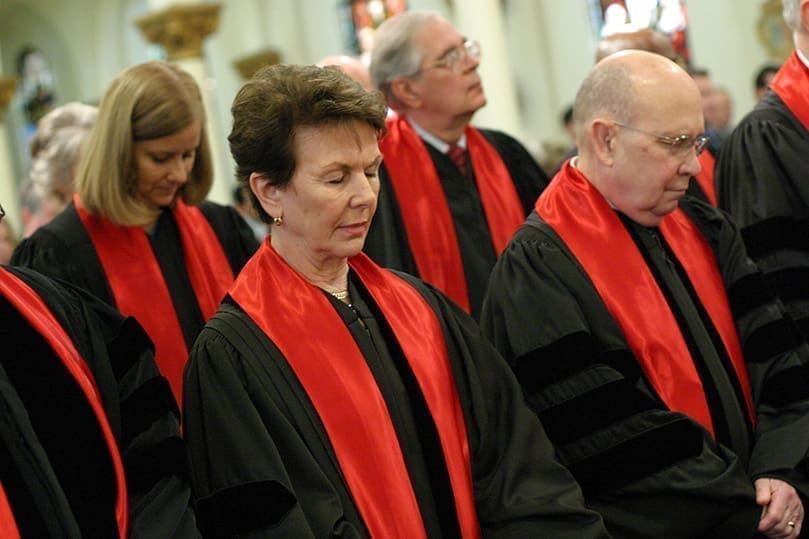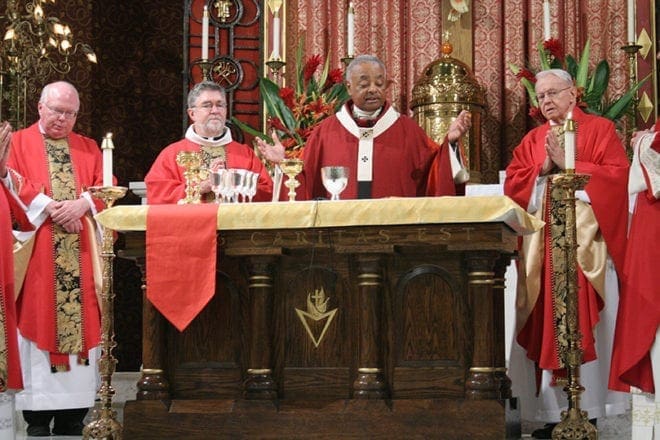 Photo By Michael Alexander
Photo By Michael AlexanderAtlanta
Judicial Year Opens With Prayer At Red Mass
By ANDREW NELSON, Staff Writer | Published October 2, 2008
Priests in red vestments and judges wearing black gowns and scarlet scarves strode into Sacred Heart Church to mark the beginning of the judicial year.
Scores of lawyers, elected officials and legal administrators filled the wooden pews of the Peachtree Street landmark Sept. 25 in the celebration of the Red Mass, a centuries-old tradition.
Archbishop Wilton D. Gregory praised the start of the new judicial year and upcoming election as an opportunity for new beginnings. He urged judges and lawyers to mirror God’s justice so truth and justice are not denied.
“We are about to begin something new. And that should and usually does manage to inspire all of us. New beginnings are good for the soul,” he said.
The Red Mass is a tradition dating back more than 750 years. It is a votive Mass, meaning it is celebrated for a specific intention. In this case, the worshippers ask for blessings on the courts and the administration of justice. The first recorded Red Mass in the United States was in 1928. The service is called the Red Mass because of the red vestments clergy members wear.

Archbishop Gregory is joined on the altar during the Liturgy of Eucharist by (l-r) Msgr. Stephen Churchwell, administrator of Christ Redeemer Church, Dawsonville, Father Thomas Meehan, pastor of Sacred Heart Church, Atlanta, and Archbishop-emeritus John F. Donoghue. Photo By Michael Alexander
People of many faiths attend the service out of respect. This year, Rabbi William Rothschild, a bankruptcy lawyer whose father was a colleague of Dr. Martin Luther King Jr., read from the Hebrew Scriptures’ Book of Numbers. Very Reverend George Tsahakis, of the Greek Orthodox Metropolis of Atlanta, read from the New Testament’s Letter of James.
All of the Georgia Supreme Court justices attended, but Chief Justice Leah Sears, who was ill.
A long line of two dozen judges led the way into the church as the St. Thomas More Schola and the Atlanta Brass Society performed. A contingent of the Knights of Columbus and Peter Claver led the procession of half a dozen priests, Archbishop-emeritus John F. Donoghue and Archbishop Gregory into the church.
Speaking to the legal community, Archbishop Gregory said the upcoming election has filled the country with hope. It is part of the blessing of living in this country and part of the gift of this country’s freedom, he said.
But electing a president does not overshadow the significant role the court system plays, he said. In fact, the courts are the “enduring and irreplaceable” sign of the freedom, he said. The courts must show a careful and balanced pursuit of justice, he said.
The symbol of justice is a blindfolded woman holding a balance in her hand, which shows how courts must work for all people without bias, be impartial and be prudent, he said. A judge must only look at the merits of cases, he said.
“Justice is a characteristic, quality, and an attribute of God himself. Whether we are Christian, Jew, or Muslim in heritage, we all believe God is permanently just,” he said.
“Your work in the field of justice is a blessing for our society,” he told the worshippers.
Following the Red Mass, the crowd walked up Peachtree Street to the Capital City Club for the awards given by the St. Thomas More Society, a guild of Catholic lawyers, who organized the day’s event.
The society recognized three individuals for their “commitment to justice and humanity”:
– Georgia Court of Appeals Judge John H. Ruffin Jr. was lauded as a trailblazer as he fought segregation.

The Honorable John H. Ruffin, Jr., Georgia Court of Appeals judge, attends the Red Mass. He was also one of three people to receive the St. Thomas More Award this year. Photo By Michael Alexander
The judge in the early 1960s was the first African-American member of the Augusta Bar Association and fought to integrate the Richmond County school system. News reports at the time said that the judge confronted “racial hostility, including hate mail and telephone threats.”
A lawyer in private practice for 33 years, he was the first African-American Superior Court judge for the Augusta judicial circuit, and the third African-American judge and first African-American chief judge to serve on the Court of Appeals of Georgia.
– William J. Brennan, the director of the “Home Defense” program at the Atlanta Legal Aid Society, has spent some 40 years helping people.
The former Marist student and seminarian has led the organization’s program that helps homeowners keep their homes away from mortgage scams and predatory loans. In 2007, his efforts helped more than 25 families avoid losing their homes.
Douglas Ammar directs the Georgia Justice Project, an “unlikely mix of lawyers, social workers and a landscape company.” He has been the head of the nonprofit since 1995.
The organization only takes clients who commit to making a life change. It brings together legal representation, social services to help clients and their families, and job opportunities with the New Horizon Landscaping Co. All three programs work jointly with clients for a better life.
Its track record of helping people stay out of jail is exemplary. Clients have a recidivism rate of 18 percent, compared to a national average of more than 60 percent. Ammar takes his passion outside the office, speaking on legal, religious and community issues.